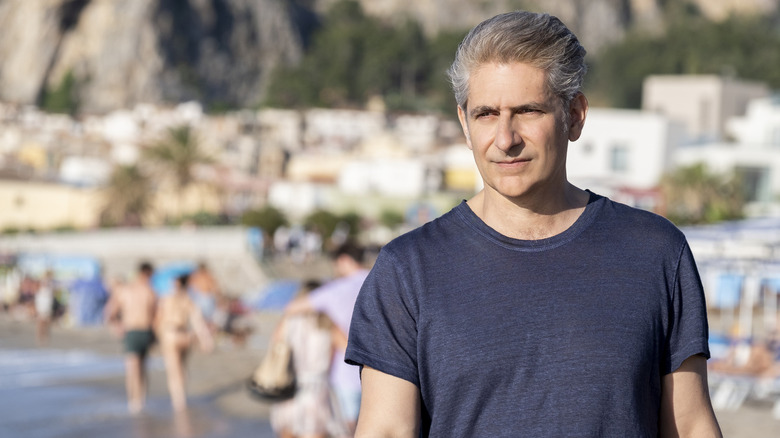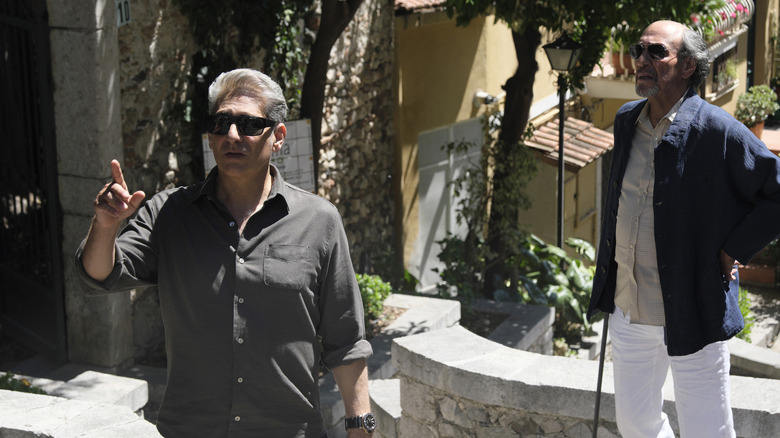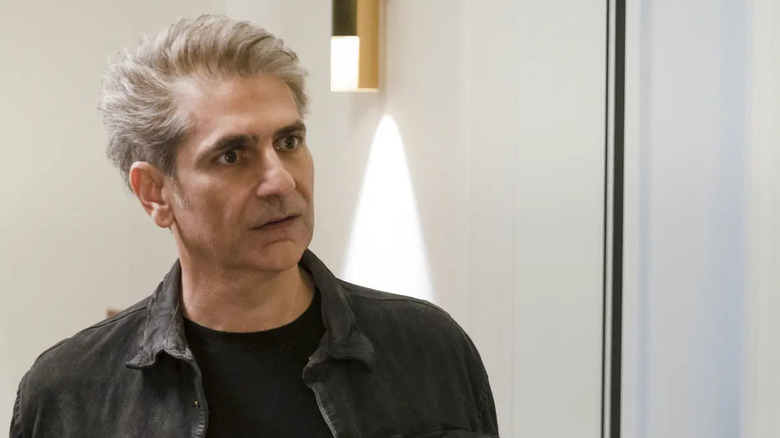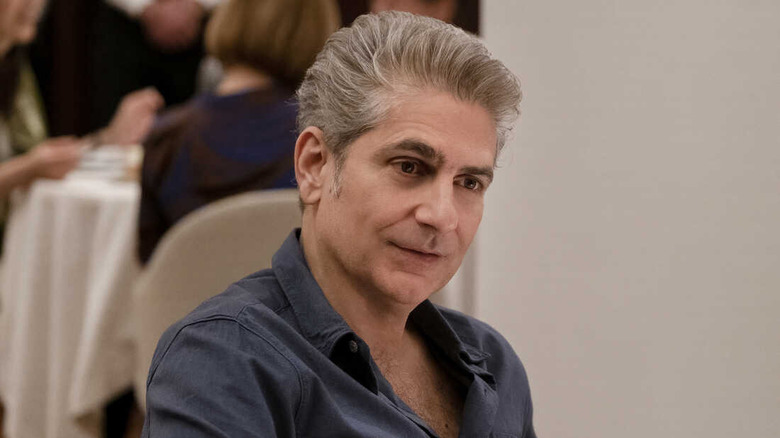Michael Imperioli Went To Some 'Horrific' Places For His White Lotus Performance
Michael Imperioli is best known for his unforgettable role as Christopher Moltisanti in what is often regarded as the best TV show of all time, "The Sopranos." He has recently re-entered the public eye in a big way having starred on HBO's "The White Lotus," which in just two seasons has quickly become a contemporary classic. Imperioli isn't just a small part of these iconic shows — his performances provide an enormous contribution to their overwhelming acclaim. In both series, his characters struggle with addiction, impulsivity, and debilitating attempts at self-reflection and self-betterment. So how exactly is Imperioli able to embody such troubled characters without descending into madness himself?
I had the pleasure of taking an acting class under Imperioli's tutelage, which was hosted by the New York-based independent production company Simone Films. The "Sopranos" star spoke to the importance of understanding your character rather than condemning them, and that this compassion and empathy would allow for a much more layered performance.
"You can't judge your character on your own moral standards, because then you're really limited by saying, 'He's bad' or, 'He's good,'" he advised us, later recounting the tip to Backstage. "This is just black and white. You have to really get into their own psychology and their pain."
While Christopher battles violent impulses and heroin addiction, Imperioli's "White Lotus" character Dominic is actively coming to terms with — and attempting to manage — his sexual addiction over the course of his vacation. Both characters commit heinous acts that hurt their loved ones, from murder to domestic abuse to infidelity, but Imperioli's willingness to explore the thought processes behind their actions is what imbues his performances with believability.
Nothing is sacred to Imperioli in his imagination
The "White Lotus" star is a particularly big fan of scenes with no dialogue, ones that require the articulation of emotion solely through the subtleties of facial expression and movement. "I'm very grateful [that] there are moments when you're dealing with just raw expression of emotion rather than verbally telling the story or verbally expressing how you're feeling, I mean, which can also be very moving and effective," he explained on NPR's Fresh Air. "But when there's no words, you really have to rely on connecting to the emotion as real as you can."
When it comes to accessing real emotions for the sake of a performance, nothing is off limits for Imperioli. However, it doesn't require a one-to-one relationship: he didn't necessarily imagine killing people during his murderous "Sopranos" scenes, but he might have imagined something that would send him into a violent rage that mirrored Christopher's emotions.
"You can use anything," he continued. "I always say nothing is sacred to me in my imagination. If I have to use something really horrific or really inappropriate or something that I would never share with anyone, tell them this is what I'm thinking about — but if it's going to create the right thing, the right emotion for that scene, I'll use it, and then I'll just put it away. You know, once I use it, it's done. I don't even think about it ever again."
It's rare that actors are able to dip in and out of a character's mental state the way that Imperioli is, particularly when playing characters as dark as Christopher and Dominic. Many notable actors like Daniel Day-Lewis and Jeremy Strong take a Method approach and remain in character for the duration of shooting, even when the cameras aren't rolling. So how does Imperioli manage to flip the switch?
The White Lotus star doesn't carry his emotions after a heavy scene
Imperioli admitted to going to some pretty dark mental places for his role in "White Lotus," but he is always able to pull himself right back out from the depths for his own imagination. "I'll never — you know, I don't go back over it, and it's not something that I carry after," he added. "You know what I mean?"
This command over his emotions could be credited largely to his Buddhist practice. He began meditating after working on "The Sopranos" but has since applied these teachings to his acting technique. As an acting instructor, he preached the way that meditation can help an actor achieve emotional homeostasis. It almost seems counterintuitive — how would learning to be calm help an actor play someone as hot-headed as Christopher or as impulsive as Dominic?
But finding his emotional center is what allows Imperioli to access such harrowing thoughts one minute and to put them out of his mind the next. Rather than take a Method approach, his meditative practice permits him to submerge and emerge from a given mindset at will.
The actor didn't have this skill set when working on "The Sopranos," having come to Buddhism later in life, but he feels that the intensity of the role may have inspired him to start practicing meditation in the first place.
"I wasn't a Buddhist when I played Christopher," Imperioli told Esquire. "Maybe that led me to wanna be a Buddhist after playing somebody so psychotic for so many years. But getting into the mindset of a hot-headed killer — all humans have the same emotions, it's just to various degrees, you know? You tap into your own and then expand on them."
Imperioli's approach is closer to Robert De Niro than Daniel Day Lewis
Although Imperioli didn't use meditation to manage his emotions on the set of "The Sopranos," he did apply a few tricks of the trade that he picked up very early on in his career. Imperioli previously played a small role in Martin Scorsese's genre-defining mob movie "Goodfellas" and closely observed Robert De Niro during filming.
The "White Lotus" star noted that De Niro would ease into character by practicing something Imperioli called "pre-scene life." For example, if a scene called for De Niro to play cards, he would start playing cards before the cameras rolled. This would help him begin to embody the inner life and outer behavior of the character before action was called. That way, he wouldn't need to take the time to "get there" after the cameras were already rolling. Imperioli also noted that De Niro could often be found taking a nap or generally conserving his energy between shots. This allowed him to save his intensity for his scenes rather than burning out off-camera, as well as to achieve the sort of meditative calm that Imperioli advocates for.
Even though Imperioli didn't meditate until later in life, the practice of maintaining emotional control was always a part of his approach. He might access some dark and personal places to play a troubled character, but he doesn't wallow in this mental state. Imperioli's on-off approach is closer to the British theatrical school of Laurence Olivier or Brian Cox than the much-discussed Method. The proof is in the pudding for this incredible actor, whose performance in "White Lotus" just earned him another Primetime Emmy nomination — playing a painful part doesn't have to consume the actor, and a measured approach can evoke a performance that is just as powerful and raw.



